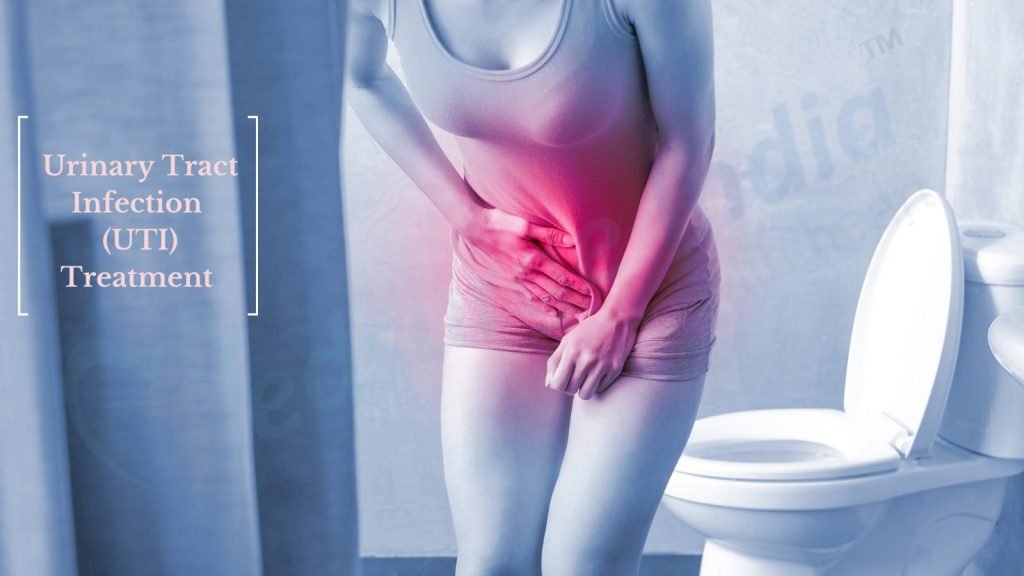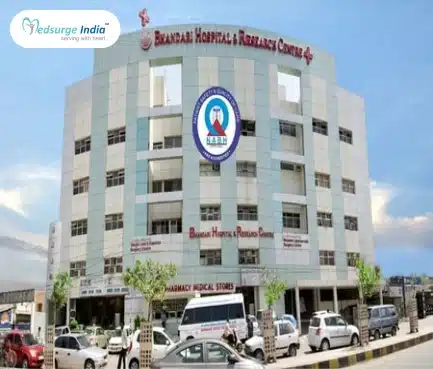
Microbes such as bacteria overcome the body’s defenses in the urinary tract, resulting in urinary tract infection (UTI). They have the potential to harm the kidneys, bladder, and the tubes that connect them. Women are more likely than men to have a urinary tract infection. A bladder infection can be extremely painful and debilitating. If a UTI spreads to the kidneys, however, serious complications can happen.
Urinary Tract Infection Treatment in India is possible with a course of antibiotic medicines. UTIs can affect people of any age or gender. However, women are four times more likely than males to have UTIs. If you have diabetes, need a tube to drain your bladder, or suffer a spinal cord injury, you’re at a higher risk.
What Urinary Tract Infection (UTI)?
Urine, one of the body’s liquid waste products, is produced and stored by the urinary tract. The sections of the urinary tract are as follows:
- Kidneys: These small organs are placed right above the hips on the back of your body. They are your body’s filters, eliminating waste and water from your bloodstream. Urine is formed from this waste.
- Ureters: They are tiny tubes that transport urine from the kidneys to the bladder.
- Bladder: The bladder is a sac-like container that retains urine before it leaves the body.
- Urethra: The urethra transports urine from your bladder to the outside of your body.
A urinary tract infection (UTI) is an infection of the urinary system. This type of infection can affect your urethra (urethritis), kidneys (pyelonephritis), or bladder (a condition called cystitis).
Bacteria are rare in urine (germs). Our filtration mechanism, the kidneys, produces urine as a byproduct. Urine is formed when the kidneys eliminate waste materials and excess water from the bloodstream. Urine normally passes through your urinary system cleanly. However, bacteria from outside the body can enter the urinary tract and cause infection and inflammation. The infection is in the tract known as Urinary Tract Infection(UTI).
What Are the Symptoms of Urinary Tract Infection (UTI)?
The symptoms of a urinary tract infection vary depending on which section of the urinary system is affected.
Lower Tract UTI Symptoms
Urinary tract infections (UTIs) affect the urethra and bladder. Lower tract UTI symptoms include:
- Urination causes the burning sensation
- Increased urination frequency without passing much urine
- The urgency of urination is increased
- Urine that looks like cola or tea color
- Urine with a strong odor
- Bloody urine & Cloudy urine
- women’s pelvic discomfort
- Men’s rectal pain
Upper Tract UTI Symptoms
The kidneys are affected by upper tract UTIs. If bacteria spread from the diseased kidney into the bloodstream, this can be fatal. This condition, called urosepsis, can cause dangerously low blood pressure, shock, and death. Symptoms of an upper urinary tract infection (UTI) include:
- Tenderness and soreness in the upper back and sides
- All-time slight fever
- Sudden chills
- Vomiting
- Nausea
Symptoms of UTI in Men
Men’s symptoms of an upper urinary tract infection are comparable to women’s. However, males who have a lower tract UTI may also have rectal pain. Pain in the penis while urinating and having sexual intercourse.
Symptoms of UTI in Women
Pelvic pain can occur in women who have a lower urinary tract infection. Constant itching, redness, and burning sensation in the vaginal area. Mental changes and confusion in long run. This is on top of the usual signs and symptoms.
What Are the Causes of Urinary Tract Infection (UTI)?
Bacteria that enter the urethra and ultimately the bladder are major causes of Urinary Tract Infections. The infection usually starts in the bladder, but it can also move to the kidneys. The majority of the time, your body is capable of eliminating harmful bacteria. Certain circumstances, however, increase the occurrence of UTIs.
Women are more likely to get them than men since their urethra is shorter and closer to the anus. As a result, following sexual activity or when using a diaphragm for birth control, women are more likely to get an infection. Menopause also increases the risk of a UTI.
The following factors also enhance your chances of getting a urinary tract infection:
- Diabetes
- Advanced age and ailments that impact personal hygiene (such as Alzheimer’s disease and delirium)
- Problems emptying the bladder completely
- Urinary catheterization
- Continence problems
- Anything that inhibits the passage of urine, such as an enlarged prostate or a narrower urethra
- Kidney stones
- For a long time, remaining stationery (immobile) (for example, while you are recovering from a hip fracture)
- Pregnancy
- Urinary surgery or other urinary tract procedure
- Weekend Immunity
- A certain form of cancers
(UTI) Urinary Tract Infection Treatment Cost in India
On average, (UTI) Urinary Tract Infection Treatment Cost in India starts from USD 30. The cost of Urinary Tract Infection (UTI) treatment in India will also depend on various factors.
Estimated prices depending on different cities in India
| Cities | Starting Price |
| Delhi | USD 30 |
| Gurgaon | USD 30 |
| Noida | USD 30 |
| Mumbai | USD 30 |
| Hyderabad | USD 30 |
| Chennai | USD 30 |
| Kolkata | USD 30 |
| Bangalore | USD 30 |
Note: Do remember that the pricing and the treatment for Urinary Tract Infection (UTI) Treatment cost in India will vary depending on the patient’s choice and other various factors.
Factors That Can Affect Urinary Tract Infection (UTI) Treatment Cost in India
The following here are some variables that can affect Urinary Tract Infection (UTI) Treatment Cost in India:
- Medication costs.
- Duration of treatment.
- Geographical location.
- Hospitalization expenses.
- Government policies and subsidies.
- Medical tourism packages.
- Hospital reputation and infrastructure.
- The expertise and experience of medical professionals.
- The type and frequency of diagnostic procedures.
- The choice of treatment modality.
Furthermore, even the standard and grade of medical care and amenities are comparable to those of the most prestigious healthcare facilities in the world, even when the expense of lodging, meals, and transportation is taken out. Also, under the direction of the most skilled physicians, Medsurge India provides patients with the lowest Urinary Tract Infection (UTI) Treatment Cost in India.
How the Diagnosis of Urinary Tract Infection (UTI) is Done?
To diagnose a urinary tract infections, your doctor will do the following tests:
- Urinalysis: This analysis determines red blood cells, white blood cells, and germs in the urine. The presence of white and red blood cells in your urine can suggest the presence of an infection.
- Urine Culture: A culture of the urine is done to determine the type of bacteria present in your urine. This is an important test since it aids in determining the best course of action.
If your infection does not respond to medication or if you keep getting infections, your doctor may do the following tests to check for disease or injury in your urinary tract:
Ultrasound: Sound waves provide an image of the internal organs in this exam. This test is performed on top of your skin, is painless, and requires no special preparation.
Cystoscopy: Special equipment (cystoscope) with a lens and a light source is used to look within the bladder through the urethra.
CT Scan: A CT scan is a type of X-ray that takes cross-sections of the body and is another imaging exam (like slices). This technique is far more accurate than standard X-rays.
Get Free Cost Estimation
Procedure
What Are Treatment Options for Urinary Tract Infection (UTI)?
A urinary tract infection treatment in India depends upon whether the infection is bacterial, viral, or fungal. Antiviral medicines are used to treat viral UTIs. The antiviral cidofovir is frequently used to treat viral UTIs. Antifungal medicines are used to treat fungal UTIs. Antibiotics are pharmaceutical drugs that fight infections by killing bacteria. Antibiotics are commonly used to treat infections of the urinary tract. Your doctor will choose the drug that is most effective against the bacteria that is causing your infection. Antibiotics that are widely used include:
- Nitrofurantoin
- Sulfonamides (sulfa drugs)
- Amoxicillin
- Cephalosporins
- Trimethoprim/sulfamethoxazole
- Doxycycline
- Quinolones
It’s essential that you take the drug according to your healthcare provider’s instructions. If your symptoms improve and you feel better, do not stop taking the antibiotic. It is possible that the infection will return if the full course of antibiotics is not taken.
If you have a history of recurrent urinary tract infections, you may be given an antibiotic prescription to take as soon as symptoms appear. Antibiotics may be prescribed for other patients to take every day, every other day, or after sexual activity to avoid infection. If you have a history of frequent UTIs, talk to Urologists in India about the best treatment option for you.
There is the best urologist hospital in India where you can get the best treatment for your infection at affordable prices.
UTI Prevention
A urinary tract infection (UTI) may typically be avoided by making lifestyle modifications. These suggestions may include:
- Practice Good Hygiene
- Drinking plenty of fluids and water
- Changing your urination habits
- Changing your birth control procedure
- Do not hold urine for a long time
A healthcare physician may recommend an estrogen-containing vaginal cream to some postmenopausal women. Altering the vaginal pH may minimize the risk of acquiring a UTI. If you suffer recurrent UTIs and have already gone through menopause, talk to your doctor.
UTIs can also be treated with over-the-counter supplements. These are occasionally prescribed as a second line of defense for those who get UTIs frequently. Before starting any supplements, consult with your doctor to see if these are a good fit for you.
Suggestion
If you have signs of a urinary tract infection, contact your doctor. Call your healthcare practitioner if you’ve been diagnosed with a UTI and your symptoms are growing worse. You might need a different approach. Keep an eye out for the following signs:
- Fever
- Backache
- Vomiting
Call your healthcare practitioner if you experience any of these symptoms or if your other symptoms persist despite treatment. A urinary tract infection (UTI) can spread throughout your body and into other organs. Treatment, on the other hand, is quite effective and can swiftly alleviate your problems.
The Most Important Frequently Asked Questions
Q: What Is the Most Effective Way to Treat a Urinary Tract Infection?
A: Antibiotics are antibiotics that fight infections by killing bacteria. Antibiotics are commonly used to treat infections of the urinary tract. Your doctor will choose the drug that is most effective against the bacteria that is causing your infection.
Q: Is Warm Water Beneficial for UTIs?
A: On an empty stomach, drink it with little lukewarm water every morning to help eliminate bacteria that cause UTIs. It kills the bacteria in your urinary system, allowing you to live a healthy life free of bacteria.
Q: Is Amoxicillin Used to Treat UTIs?
A: Antibiotics are the standard treatment for a urinary tract infection (UTI), as many women (and men) are aware. The most effective antibiotic depends on which bacteria is causing the infection; nonetheless, amoxicillin is a typical treatment.
Q: Is Turmeric Beneficial in the Treatment of Urinary Tract Infections?
A: Additionally, thanks to a component in turmeric known as curcumin, its action as a potent antioxidant aids it in fighting bladder infection on a secondary level. Turmeric’s antioxidant properties can aid in the prevention of disease.
Q: How Can I Make Peeing Less Painful?
A: Drinking extra water or using an over-the-counter pain reliever (such as Uristat® or AZO®) to treat painful urination are two options for reducing the discomfort of a painful urination. Prescription drugs are required for other therapies.
Top Hospitals for Urinary Tract Infection (UTI) Treatment in India
Top Doctors for Urology Treatment
Dr. Anil Mandhani
Director
Experience: 27 years of experience
Fortis Memorial Research Institute
Gurgaon, India
Dr. Madhav Sanzgiri
Senior Consultant
Experience: 31+ years of experience
Manipal Hospital, Panaji, North Goa
North Goa, India
Dr. Sarita Bhagwat
Senior Consultant
Experience: 25 years of experience
Fortis Hospital, Mulund, Mumbai
Mumbai, India
Dr. Ajit Sawant
Consultant
Experience: 16 years of experience
Dr. L H Hiranandani Hospital, Mumbai
Mumbai, India
Dr. V K Subramaniam
Consultant
Experience: 32 years of experience
Fortis Hiranandani Hospital, Vashi
Mumbai, India
Dr. Rajesh Loonia
Senior Consultant
Experience: 23+ years of experience
Narayana Multispeciality Hospital, Andul Road, Howrah
Howrah, India
Dr. G. C. Malakondiah
Senior Consultant
Experience: 39 years of experience
Gleneagles Global Hospital, Lakdikapul, Hyderabad
Hyderabad, India
Dr. S. V. Kotwal
Head of Department , MBBS, MS, MCh
Experience: 40 years of experience
Gurgaon, India
Dr. Deepak Garg
Senior Consultant
Experience: 14+ years of experience
Max Super Speciality Hospital Dehradun
Dehradun, India
Dr. Jayaprakasha G
Experience: 28+ years of experience
Jindal Sanjeevani Multispeciality Hospital, Bellary
Bellary, India
Dr. Yajvendra Pratap Singh Rana
Endourologist Consultant
Experience: 15 years of experience
BLK Super Speciality Hospital, New Delhi
New Delhi, India
Dr. Anup Gulati
Associate Director
Experience: 15 years of experience
Fortis Escorts Hospital, Faridabad
Faridabad, India
Dr. Sivaraman Balakrishnan
Senior Consultant
Experience: 40 years of experience
Apollo Hospitals, Greams Road, Chennai
Chennai, India
Dr. Ranjan Kumar Dey
Consultant
Experience: 31 years of experience
Ruby General Hospital, Kolkata
Kolkata, India
Dr. Anupam Bhargava
Chairman
Experience: 44 years of experience
Max Smart Super Speciality Hospital, Saket, New Delhi
Delhi, India
Dr. Ashish Sabharwal
Senior consultant
Experience: 20 years of experience
Indraprastha Apollo Hospitals, New Delhi
Delhi, India
Dr. Sujit Chaudhary
Senior Consultant , MBBS, MS, MCh, Fellowship, FRCS
Experience: 21 years of experience
Indraprastha Apollo Hospital, New Delhi
New Delhi, India
Dr. Gursev Sandlas
Consultant
Experience: 14 years of experience
Kokilaben Dhirubhai Ambani Hospital Mumbai
Mumbai, India

































































